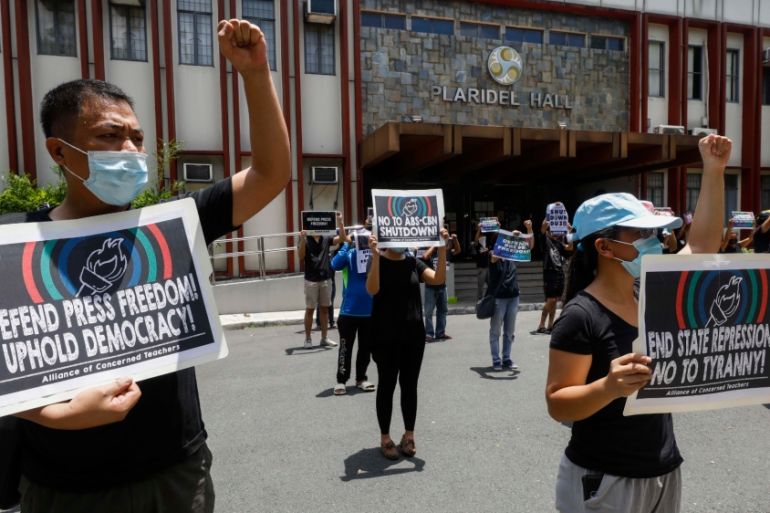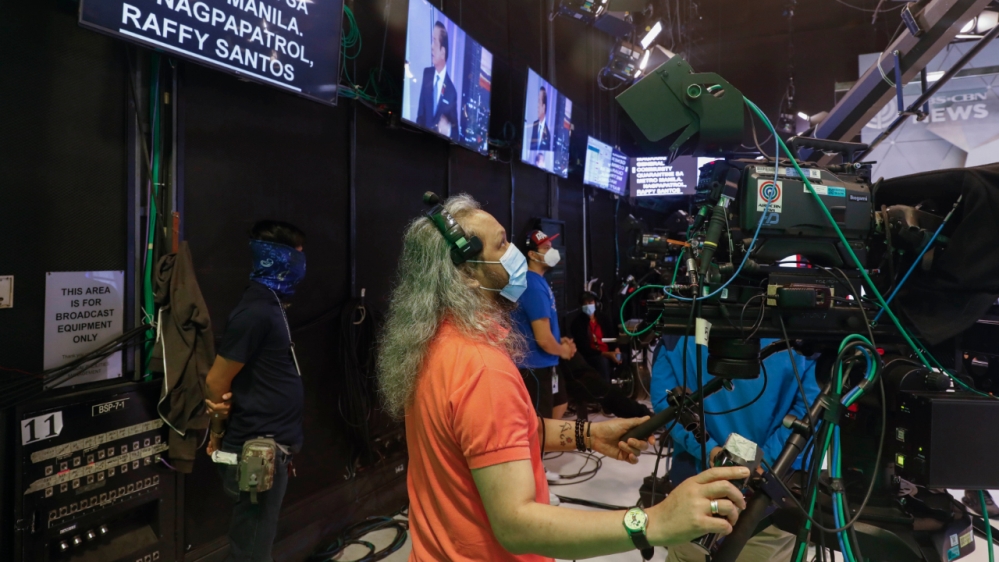Philippine TV network ABS-CBN to remain shut pending court order
Supreme Court gives government and Congress 10 days to comment on plea to immediately reopen shuttered media company.

The Philippines’ largest television network will remain shuttered after the Supreme Court refused to act on Tuesday on a plea for the immediate resumption of operations, ordering instead the government to respond to the petition within 10 days.
ABS-CBN has been fighting a government shutdown order, which press freedom advocates and legal experts say is an attempt by the administration of President Rodrigo Duterte to silence critical media.
Keep reading
list of 4 itemsNPR editor resigns after accusing US outlet of liberal bias
Lawmakers brawl as Georgian Parliament considers ‘foreign agent’ bill
Journalist loses foot after being badly wounded in Israeli attack in Gaza
The country’s highest court deliberated on the case during a full session in Manila, as justices returned to work following the partial lifting of a two-month lockdown because of the coronavirus.
MORE
According to reports, the justices voted unanimously to give the government regulator, the National Telecommunications Commission (NTC) – as well as both chambers of Congress – 10 days within which to comment, and another five days for the petitioner, ABS-CBN, to give additional response.
In an urgent plea filed on Monday, ABS-CBN argued that the May 5 closure order issued by NTC had caused “grave injustice and irreparable injury” not only to the network but also to the viewing public.
The NTC is under the office of the president and is a government agency that regulates television and radio broadcasts in the country, as well as the operations of telephone companies.
Since the NTC ordered the shutdown, ABS-CBN said the company had lost an equivalent of between $10.8m and $12.6m in advertising revenue, endangering the livelihoods of its 11,000 employees.
“If this severe financial haemorrhage is not stopped, ABS-CBN may be constrained to eventually let go of workers, reduce salaries and benefits, and substantially cut down on costs and expenses,” the court petition said.
|
|
On Monday, the share price of ABS-CBN stocks also fell 9.6 percent following the resumption of trading after trade was halted on May 5.
On Tuesday, the company’s president and CEO, Carlo Katigbak, told a Senate hearing that if ABS-CBN remains closed, it would consider laying off workers by August due to financial constraints.
In an earlier plea filed before the Supreme Court last week, ABS-CBN cited the equal protection clause of the constitution and the right to due process in arguing against NTC’s immediate closure.
The NTC maintains that it had no choice but to issue a “cease and desist” order, citing the expiration of ABS-CBN’s 25-year franchise to operate on May 4.
Former Supreme Court Justice Antonio Carpio argued in the Philippine Daily Inquirer newspaper that NTC has never issued a “cease and desist order” before and that it “obviously discriminated unfairly” against the network, by denying its “constitutional right to equal protection of the law”.
‘Unparalleled reach’
In its follow-up plea on Tuesday, ABS-CBN, however, said NTC’s closure order contradicts the “intent and desire of Congress” to allow the continued operation of the company pending renewal of its franchise.
In February the NTC had already signalled to Congress that it would issue a temporary licence to ABS-CBN, while it awaited legislators’ approval of a new franchise. The agency later reneged on its promise and ordered a shutdown. NTC is also reportedly trying to strip ABS-CBN of its frequency signal.
On Monday, the House of Representatives, which is dominated by Duterte’s allies, resumed deliberations on an interim bill giving ABS-CBN a provisional franchise. But the debate was abruptly suspended, demonstrating the uncertainty hanging over the network’s return to regular programming.
With the prospect of the franchise deliberations possibly dragging on for months, ABS-CBN has asked the Supreme Court to allow the resumption of its operations, citing previous instances of the NTC permitting stations to continue operating pending renewal.
Before it was ordered closed, ABS-CBN had a share of 44 percent of the television audience market nationwide, ahead of its closest competitor, media company GMA Network, whose 25-year franchise was renewed by Congress and signed by Duterte in 2017.
“With ABS-CBN’s unparalleled reach, it is imperative that ABS-CBN be on air to give timely and reliable information to the public, especially in light of the current public health emergency and the natural calamities that regularly threaten the country, such as typhoons, earthquakes and floods,” ABS-CBN’s plea on Monday said.
In a previous statement to Al Jazeera, Shawn Crispin, a senior representative of the Committee to Protect Journalists in Southeast Asia, strongly condemned the shutdown, and called on authorities to allow ABS-CBN “to continue to operate under a provisional licence arrangement.”
Frequent target of Duterte
Since becoming president in June 2016, Duterte has repeatedly stressed his wish to close down ABS-CBN, claiming the channel refused to run his political advertisements during the campaign season – allegations the network has denied.

ABS-CBN’s coverage of Duterte’s so-called war on drugs, which has killed thousands of people, also angered the Philippine president, and on several occasions, he has threatened to block the renewal of its franchise, while suggesting the owners should sell the company.
Still, Duterte has not always been so hostile towards the broadcaster.
While he was mayor of Davao City in the southern island of Mindanao, Duterte appeared as a regular host of a television programme that aired over one of ABS-CBN network’s local stations.
During the 2016 campaign, Duterte also appeared as a guest of a popular ABS-CBN TV show, boosting his national profile.
Now, however, his Solicitor General Jose Calida is pushing for the end of the country’s largest network, citing a 2003 Supreme Court decision, which ruled that the NTC could not issue a provisional permit without the legislature’s backing.
|
|
The chairman of the National Union of Journalists of the Philippines, Nonoy Espina, has criticised Congress for sitting on the franchise renewal for a long time, adding that “there isn’t any good faith” among its leadership to approve the bill quickly.
“No matter what they do, they can never shake off the perception that they twiddled their thumbs because of Duterte’s repeatedly expressed wish to block the renewal of the network’s franchise,” he told Al Jazeera.
By shutting down the country’s largest broadcaster, Espina said the Duterte administration is creating a “chilling effect, not so much among the journalists on the ground, but among the owners and management and this, more than any actual threats on reporters, would put a crimp on independent and critical reporting.”